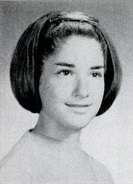Sandra Lee Scheuer
Sandra Scheuer | |
|---|---|
 Scheuer c. 1967 | |
| Born | Sandra Lee Scheuer August 11, 1949 Youngstown, Ohio, US |
| Died | May 4, 1970 (aged 20) |
| Cause of death | Gunshot wound to neck[1] |
| Resting place | Ohev Tzedek Cemetery, Mahoning County, Ohio, U.S. 41°03′39″N 80°42′43″W / 41.0608°N 80.7119°W (approximate) |
| Occupation | Student |
Sandra Lee "Sandy" Scheuer (/ˈʃɔɪ.ər/; August 11, 1949 – May 4, 1970) was a student at Kent State University in Kent, Ohio, when she was killed by Ohio National Guardsmen in the Kent State shootings.
Background
[edit]Scheuer was born in Youngstown, Ohio, the daughter of Sarah (Lacko) and Martin Scheuer.[2] She had an older sister, Audrey. She was Jewish.[3] She was an honors student in speech therapy, and was a graduate of Boardman High School.
May 4, 1970
[edit]Scheuer did not take part in the Vietnam War protests that preceded the shootings. She was shot in the neck with an M-1 rifle from a distance of 130 yards (119 m) while walking between classes. The bullet severed her jugular vein and she died within five or six minutes from loss of blood. According to the account of her boyfriend Bruce Burkland, Scheuer "was walking with one of her speech and hearing therapy students across the green. Caught in the gunfire, neither Sandra nor the young man had anything to do with the assembly of students on the green."[2] Three other unarmed students were also killed in the shootings: Allison Krause, Jeffrey Miller, and William Knox Schroeder.
The shootings led to protests and a national student strike, causing hundreds of campuses to close because of both violent and non-violent demonstrations. The Kent State campus remained closed for six weeks. Five days after the shootings, 100,000 people demonstrated in Washington, D.C., against the war.
Scheuer had been a member of the Alpha Xi Delta sorority,[4] and current members of this sorority speak in her memory each year on the Kent State University campus at the May 4 Task Force's commemoration of the 1970 tragedy.
In 2018 an exhibit in memory of Scheuer called "Sandy's Scrapbook", based on an actual scrapbook she kept while attending Kent State, opened at the University's May 4 Visitor Center.[5]
In popular culture
[edit]Just after Scheuer's death, the songwriter Harvey Andrews composed a song titled "Hey Sandy",[6] whose lyrics are addressed to her:
Did you see them turn, did you feel the burn
Of the bullets as they flew?
In the song "Ohio", which was written immediately after the shootings, folk rocker Neil Young made a reference to Scheuer in the chorus:
What if you knew her,
And found her dead on the ground?
How can you run when you know?
Scheuer is also remembered in poet Gary Geddes' poem "Sandra Lee Scheuer", found in his 1980 collection The Acid Test.[7] An image of a memorial to Scheuer was included in the CD case to The Argument (2001) by Fugazi.[8]
References
[edit]- ^ "Senate Congressional Record". July 22, 1971. Retrieved February 17, 2024.
- ^ a b "May 4 Archive - Sandy Scheuer". May4archive.org. Retrieved 31 January 2019.[permanent dead link]
- ^ "Remembering Kent State as an American Tragedy With a Jewish Face". 29 April 2010.
- ^ "Heritage Timeline - 1970". Alpha Xi Delta. Retrieved 2007-08-15.
- ^ "Kent State's May 4 Visitors Center Focuses on Life Amid Tragedy in "Sandy's Scrapbook" Exhibition | School of Visual Communication Design | Kent State University". www.kent.edu. Retrieved 2019-10-12.
- ^ Gwin, Harold (2010-04-25). "A life cut short – Sandra Scheuer". Vindy.com. The Vindicator. Archived from the original on 2016-10-31. Retrieved 2016-10-30.
Not long after the shooting, Harvey Andrews, a British songwriter, wrote the song, "Hey, Sandy" about her death...
- ^ "Canadian Poetry Online – University of Toronto Libraries – Gary Geddes". Canpoetry.library.utoronto.ca. Retrieved 31 January 2019.
- ^ "Fugazi: The Argument (2001): Reviews". Sputnik Music. Sputnik Music, Inc. Retrieved 2009-03-19.
Further reading
[edit]- Jedick, Peter (2006). "Rawls' Death Brings Back Sad Memory." Plain Dealer (Cleveland, Ohio), February 13, 2006, D3.
External links
[edit]- Contemporary news article pertaining to the Kent State shootings
- Sandra Lee Scheuer at Find a Grave
- Sandy's Scrapbook at kent.edu
- Archived FBI files relating to the Kent State shootings
- May4Archive.org – maintained by author J. Gregory Payne, Ph.D
- Kent State Truth Tribunal: A webpage founded by Laurel Krause and Emily Kunstler devoted to the May 4, 1970 shootings
- Four Dead in Ohio: A BBC audio documentary pertaining to the Kent State shootings
